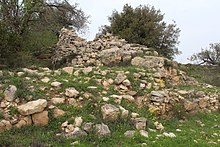Bethel
![]()
This article is about the biblical place Bet-El. For the modern Israeli settlement, see Bet El; for other uses, see Bethel.
Bet-El (Hebrew בֵּית אֵל "House of El" or "House of God"; also called Bethel) is a place mentioned in the Bible, 17 km north of Jerusalem and 16 km south of Silo in the Israeli-occupied West Bank.
Bet-El is the second most frequently mentioned place in the Bible, after Jerusalem. A number of roads also crossed at Bet-El, connecting the site, which was important in biblical times, with Jerusalem, Bethlehem, Hebron, and Be'er Sheva (north-south connection), as well as with Joppa on the Mediterranean Sea (west connection) and with Jericho, located on the Jordan River (east connection). The city is said to have been inhabited since the 21st century BC.
According to biblical tradition, Abraham stopped at Bethel when he came to Canaan after being in Shechem:
"From there he set out for the hill country east of Beth-el and pitched his tent so that he had Beth-el on the west and Ai on the east. There he built an altar to the LORD and called on the name of the LORD."
- (Genesis 12:8 EU)
Later biblical accounts indicate that Bet-El originally bore the Canaanite name "Lus". Jacob spent the night at this place during his flight from Esau on the way from Be'er Sheva to Harran. In a dream he saw a ladder or stairway (Jacob's Ladder), the top of which reached to heaven, on which angels of YHWH ascended and descended, and above which stood YHWH, who spoke to Jacob and confirmed the Abrahamic promise.
"Then Jacob awoke from his sleep, and said, Verily Yahweh is in this place, and I knew it not. Then he was afraid, and said, How dreadful is this place! Yes, this is the dwelling place of God and the gate of heaven!
Early in the morning Jacob took the stone he had laid at his head, set it up as a painting stone, and poured oil on the top of it. And he called the name of that place Bethel: but before that the name of the city was Lus."
- (Genesis 28:16 - 19 TB, 1899 Text Bible)
In Genesis 31: 48-53 YHWH again spoke to Jacob in Haran, revealing YHWH to be the one who had spoken to him in Bet-El. Further mention of Bet-El is found in many other passages, showing its importance at the time of the biblical action.
During the Israelite period, it became an important religious center and at times competed with Jerusalem for prestige. The first king of the northern kingdom of Israel, Jeroboam I, has a golden calf erected in Bethel, as well as in Dan, to provide a counterpart to the central sanctuary, the temple in the southern kingdom. Jeroboam I is therefore strongly condemned by the Deuteronomistic historians who consider the Jerusalem Temple as the only legitimate sanctuary of YHWH.
The site is now found near the Palestinian village of Beitin in the West Bank. It is believed that the name Beitin is the Arabic form of the former Betel. Nearby there is still the Jewish settlement of Bet El, but it was only built there by Israel after the Six-Day War in 1967.

Watchtower of Jeroboam's Temple in Beth-El
Search within the encyclopedia